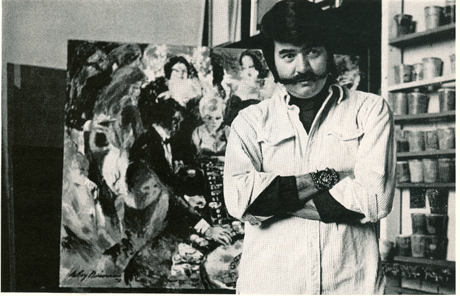John Ed Bradley played football at LSU and was a rising star at the Washington Post in the 1980’s before he left the newspaper business left to write novels. He’s written some fine ones too, including Tupelo Nights, Smoke, Restoration and My Juliet. He also wrote It Never Rains in Tiger Stadium, a wonderful memoir about playing ball at LSU. In the meantime, he’s been a first-rate magazine writer, notably for Esquire and Sports Illustrated.
Here’s one of his best Esquire stories, first published in December 1985, and reprinted here with the author’s permission.
“L.T. and the Home Team”
By John Ed Bradley
Out one night last summer in Williamsburg, Virginia—a night that started warm and breezy but quickly turned as hot and rank as old meat—D’Fellas quit talking about local trim for a minute and somebody started on God. Eric Stone, gazing cow-eyed at a sky only half as big as his dreams started on God but soon let Pritchett figure it out. Pritchett was smart and he thought he could figure everything out. Even that outsize belly of his—brought on, everybody said, by the wife’s collard greens and smothered pork chops and whatever fruit pie happened to be in the cupboard—Pritchett liked to figure the extra girth was really only a stretch of “clogged tool,” and he told D’Fellas so. He patted his big gut and hiked up his britches and let his chin multiply into a fleshy mosaic.
“Preacher man,” Lawrence.Taylor had told Dylan Pritchett earlier in the day, “you’re fatter’n Fat Albert…. How much is it you been weighin’ these days?”
And Pritchett had said, “I’m tellin’ you it ain’t fat. It’s an extension of something else. Backed way up my belly…. I’m a gigolo, man.”
Now, at about 1:00 in the morning or a little after, Taylor was working a shaggy pinch of long-cut between cheek and gum, looking off in the direction of town. He started, “You’re just bogartin’ again, Pritchett, Preacher Pritchett runnin’ his head”—and saw it coming, growing way off in the distance, moving at a ridiculously happy clip. There was a single white eye in the head of the machine, a light more yellow, really, than white. Arid the sound was of wild unrest, of steel on steel, dark and real and terrible.
Cosmo, who sometimes went by the name of Glenn Carter, pulled his hand off his crotch, where he’d been working an itch, and pointed for everyone to see. He said, “A coal train, boys. Look at that damn thing.”
And someone else, probably L.T., who had returned home to see D’Fellas and spend one last night on the town before his fifth season with the New York Giants took him away for at least six months, said, “It’s magic, I’m telling you, fellas. It’s like every old thing that ever used to be.”
Besides the single white beacon from the engine, there was another wash of lights, this from D’Fellas’ party van parked in the middle of the dead-end road, and you saw how Taylor stood in it. Farm-boys big at six feet three and 250 pounds, the best player in football wore tight gray gym shorts that made his butt look like two great humps of meat grafted onto legs that can cover forty yards in 4.5 seconds. He wore a white straw hat with an olive-colored linen band, the brim tipped down low over the eyes, and his shirt was cut loose around the belly, giving him room to breathe.
“This is nice,” Taylor suddenly felt inclined to say. “I mean, this is really nice. All it was ever supposed to be.”
Then, with his eyes on nothing at all, down on the pea gravel at his feet: “So many things, mostly the good ones, D’Fellas were part of. It never goes away, either. That feeling, l mean, of being together again. You see that train, and you see all of us, standing here again. l’in telling you, it never goes away.”
L.T.—THERE HE WAS, SAME OLD BOY, running with the same old boys he had run with since second grade—had come home again. hardly seemed to matter that he’d moved way the hell up north and made something of himself, earning in the neighborhood of $1 million a year. He might take home about $85,000 a game, as one of his defensive mates once figured out on a pocket calculator, but after watching him break through a double-team block and dump a quarterback in a great, whining heap, or intercept a pass and take it down the pasture for a touchdown, it was never hard to understand why even his enemies said he was worth every damn penny.
During Taylor’s NFL career more than a couple of coaches have wondered aloud how someone playing on the buck-ass end of the defensive line can so dominate a game. As an outside linebacker, Taylor has been known to chase down running backs, fleeing in the opposite direction, like some hard dog after his own tail. He has put the fear of permanent disfigurement in all offensive people who look too good and smell too sweet, winking at them as he often does from across the line of scrimmage, seconds before the snap of the ball. They have called his game make-do and creative, mainly because he behaves as he pleases out there, sometimes forsaking the coach’s music he picked up in camp for the primal song that makes him go. Coming from the “weak” or “blind” side of the line, he often emerges on quarterbacks preparing to pass like some awful wave of terror. He seems to focus on a point two feet behind his target, blow right through what meat, bone, and heart stand in the way, and come out screaming on the other side.
“We don’t know the difference in L.T.,” Pritchett once professed. “We see a good tackle and it’s a good tackle. But whether he plays well or not, we’re there. We’re still his brothers, man. We’re blood, you know.”
Taylor, D’Fellas back home always said, never forgot where he came from, even though he kept a fancy place in a subdivision in Upper Saddle River, New Jersey, a big two-story brick house with a lawn that was more garden than yard, and a gold Mercedes-Benz parked out front. He kept the house, his wife, Linda, said, but you could never keep him in it, not even during the off-season, when he liked to shoot hoops in the sun and play a little golf and take an occasional trip south to Williamsburg, in the southeastern heel of the state, to visit the boys.
There were only six of them in the whole world—D’Fellas—and each founding member owned a plaque proving it. Only three, Cosmo, Pritchett, and Stoney, still lived in the town where they grew up. The one Taylor seemed to miss and admire most, John (J.D.) Morning, managed a seafood place in Winston-Salem, North Carolina, and Eric (Doc) Pruden earned his living making Busch beer in Virginia Beach.
Earlier, driving around with no place in particular to go, somebody had said it felt as if every clock and calendar in the Virginia countryside had been turned over on its face, as if time no longer mattered. Having drunk more than a few bottle of beer at the Green Leafe Café near the campus of William and Mary, even L.T. owned up to finding himself overcome by a flood of lost time. So they had taken a craze of narrow back roads to a place on the edge of town, where a bridge made of creosoted railroad ties had once crossed a great divide and where a freight train still passed every few hours, whining like a pack of rabid wolf-hounds hot for the kill.
The old Mooretown Bridge, directly above, had barely been wide enough for two small cars to pass. D’Fellas had called it the Motown Bridge, because they had come time and again to lean against its rickety railings and sing the blues and talk about God. And about women and football Friday nights at Cooley Stadium and about what it meant to be young and alive and in no great hurry to grow up.
Now, on a rag-ass Sunday night that lent more moon than stars, Taylor stood behind the hurricane fence and heavy iron rail sealing off the short stretch of blacktop that had once led to the treacherous expanse of warped and buckling boards, and remembered the night the bridge burned. Stoney, who works at:the firehouse, had driven out with the water trucks and seen it engulfed in flames. Little orange chips of wood and ash had climbed in the night air, and no one but D’Fellas figured it was a bad thing. Too many people had died on the bridge or thereabouts. And Taylor, who rarely looked back on his days with D’Fellas except to laugh, saw this: the time an old drunk had tried to walk across the bridge with his eyes closed, nursing a bottle of cough syrup. The man had said he was Jesus Christ come down to save tile world. Then, not five minutes after announcing that he could walk on water, the man had lost his footing and fallen. He had fallen all the way down to the tracks and lain there in a silent, unmoving heap.
Taylor told the boys, “Crazy nigger thought he could walk on water. He couldn’t even walk straight.”
And who, L.T. said he wondered, could figure how many people had died trying·to negotiate the curve leading up to the bridge? Seemed like every Friday and Saturday night somebody missed the turn and drove clear into the void. L.T. once joked and said the Motown Bridge killed more poor colored folks than the Klan ever did. But there was good about it, too.
There was this to look back on: that one impossibly cold night when he and D’Fellas stood in the middle of the expanse, huddled against the snow that fell in hard, white sheets. The headlight of a train had appeared up ahead, moving in the direction of the pottery factory. As it drew near, you could see the dark chunks of coal in the open-top cars. dusted over with snow. There was a fabulous blue winter light that seemed to come from no particular source. Years later Stoney would pick a little fleck of something off the tip of his tongue and ask if anything on this earth had ever looked as pretty.
That night, the cold had made their lips feel useless and rubbery; their lungs burned, but they had sung their songs anyway, until about 6:00 in the morning. Taylor provided bass, deep as grubworms in a canna bed, and Stoney was static. He sounded like nails on a chalkboard, and everyone looked for Doc and J. D. to make pretty as choirboys at Sunday service. Sometimes Cosmo got so high, the boys said, he could do it better than a castrated man, but you tried not to hear Pritchett, who this night was moaning like a sick calf on the way to the sale barn. One blow, a pretty one that applied, went:
Gawnna leave all the crowds
Climb to the clouds
Anna look at life the way we use’a doo
Now Taylor wanted to know, “Who was it that pissed on the train as it went by that time it snowed so damn much?” But you could barely make out his voice over the thunder of the train down below.
“This is some serious memories,” Pritchett said. “Some serious memories. I used to ride my bike all around here. I remember how the bridge smelled. It ain’t the same. I’m used to feeling it under me.”
“Was it you that pissed?” Taylor asked no one in particular.
And Stoney started, “You can’t reach out and touch it anymore. There was only four or five feet between the bottom of the bridge and the top of the train cars. You could remember the feeling in your feet—that feeling that what you stood on wouldn’t be there very long and when it went, it would take you with it. And you went to bed at night feeling that feeling, wondering at it like some kind of mystery.”
Then Cosmo, half shouting atTaylor, let on, “I remember how you’d climb down to the tracks and say you were going to stop the train. We believed you could stop it, L.T. ‘That train ain’t nothin’,’ you’d say. And it would get pretty close before you jumped off the tracks. Then we’d all take turns, climbing down the rocks and standing on the tracks. ‘That train ain’t nothin’,’ you’d say. And Pritchett went, ‘Go on and stop it then, Cosmo.’ And I told him, ‘Who do you think I am? I ain’t no L.T.'”
“It might have been me that pissed,” Stoney said finally. “Hey, Taylor. I think it was me that pissed.”
Then Pritchett figured, “It wasn’t only you, man. It was all of us. It was Taylor, too. Shit, it was all D’Fellas. We did everything together.”
D’FELLAS ALWAYS caught L.T.’s games on television when the Giants went national, and the made it up north to New Jersey and the Meadowlands three or four times a year to watch their old friend perform in person, before great crowds that sometimes chanted, “Elllteee! Ellltee! Eltee!” when number 56 came up with a big hit. He always put D’Fellas up at home, in his house, and on Saturday nights before the games, when he had to turn in early, he gave Linda some money and the car keys and insisted she drive the gang to New York, where there were things to do.
The boys flew out to Hawaii for the 1985 Pro Bowl, and L.T., who had been a unanimous all-NFL selection since the Giants chose him first in the 1981 draft, put them up in individual hotel suites with king-size beds, living rooms, and private liquor cabinets. He took care of their expenses and introduced them to strangers on the beach as teammates. Even Stoney, who was built like a tired old catcher’s mitt, signed a round or two of autographs.
D’Fellas were proud of L.T.’s success and read countless reports saying he had emerged as the most dominant player in professional football, if not the very best, but they preferred to remember him as the wild-eyed boy who worked at the Dairy Queen in the summer when he was seventeen, eating all those free sundaes and Dilly Bars and going home to Iris, his beautiful, picture-book mama, and asking what’s for supper. He was just that way when he was growing up: eat anything. As a high school junior he stood only five feet ten and weighed 180 pounds. But coming into his senior year, he grew more than five inches in three months and grew mean in a way that would make him rich and famous and, arguably, the finest linebacker ever to play in the National Football League.
D’Fellas preferred to remember him the night they were going down Richmond Road in Pritchett’s car, Pritchett driving the limit if not a hair more. It was broad daylight when the good preacher man—who really wasn’t a preacher at all, but a supervisor of the black-history program at the Colonial Williamsburg Foundation—ran head on into a pair of German shepherds copulating in the middle of the road. Both dogs, worked up, as they were, in primal heat, died on the spot. But what you remembered was Pritchett driving off as if nothing happened and thinking that Taylor, if provoked, could hit you just as hard. He’d take your damned head off, everybody said. He’d take your damned head off and spit in your neck. Then, if further provoked, he’d crawl down what was left of your throat and do a little tap dance on your tonsils.
While at the University of North Carolina, one of only two schools to recruit him out of high school, Taylor spent more than a few nights terrorizing frat boys. He liked to go downtown, into Chapel Hill, and pick fights with people who didn’t look right. He took to chewing tobacco and spitting a lot. He cut classes and hid out in the student union, shooting pool until he ran out of quarters or out of luck, whichever, came first. He once said, “I’m the kind of person who refuses to allow any damn good thing in life to pass me by.”
But during his junior year in college something changed him. The boys said it all started when he met Linda. She was so beautiful, you imagined her picture on some neon board above the city, wearing silk, wearing velvet, and holding a silver goblet to her lips. Looking the way she did, you imagined her drinking a mint julep and saying something like, “Goes down good,” to a world gone bad.
She asked Taylor, “Why do you keep pushing people around?” Then she called him a monster and a bully.
It was not hard to figure why the young man, then only twenty, became love-sick so bad. More than one night, he had sat alone in his dormitory room, waiting for the telephone to ring; the girl on the other end to speak his name. Hi there, baby. Something had changed him, all right. Something had tamed him too. L.T. discovered that the best way to earn someone’s respect was out on the pasture, on the football field, where playing the hoodlum had its rewards. His coaches, aware of his enormous potential as.an outside linebacker, decided to turn him loose. They let him rely on instinct more than any hardline technique that might have come up during a head session, and their thinking paid off.
His junior year, Taylor made eighty solo tackles and caused seven fumbles. The next year, 1980, he made fifty-five solo hits and accounted for sixteen quarterback sacks on his way to winning honors as the outstanding player in the Atlantic Coast Conference. He made all-American, easy, and was the second player chosen in the draft, after Heisman Trophy-winner George Rogers of the University of South Carolina.
As a rookie in the NFL, Taylor was so impressive people started comparing him to the finest defensive players in the history of the game, linebackers such as Dick Butkus, Sam Huff, and Ray Nitschke. His contribution on the field was so significant, he helped lead the Giants to the play-offs, their first such trip in almost twenty years. Back home in Williamsburg, D’Fellas had no trouble taking L.T.’s good story in stride. They knew Taylor was bad, but it had always been good to be bad when they were coming up. They liked to remember what L.T. did that day to poor old Nathan Merritt, who might have become one of D’Fellas had he not died in a car crash out on Longhill Road, on the way to school.
It was just something that happened at Lafayette High School one morning, back when D’Fellas indulged in a lawless game of rough-and-tumble called Chester. The way it worked, you walked around campus with your chest exposed, and one of the boys, by right of charter membership in D’Fellas, could lay a hard right hand into your open titty. Whenever the aggressor landed a big hit, he was supposed to say, “Chester’s back in town,” and clear out as quickly as possible, before his victim was able to regain his senses and take retaliatory measures. One day poor old Nathan Merritt opened up on Eric Stone, then only a freshman, and hit him way below the breastbone, nearly knocking him unconscious. L.T., who saw the cheap lick and came running, pinned old Nathan Merritt to a run of lockers and tried to press him through the slats in the louvered door. There was a storm of fussing in the hall, and L.T. started shouting, “Who the hell you think you are, shithead, hittin’ my friend so goddamned hard?”
Taylor was just that way: good to the people he loved and hard on those he didn’t. The kind of love that made him and the boys different, it was fierce and final. They had a time saying it, but D’Fellas were family in a way that ran deeper than any old blood, in a way that would last the sum of six separate lifetimes, and not a day longer. It was forever, but only for now. They often said their children would carry on the line and form their own little clique, the second generation of D’Fellas, but they said this with little conviction. Their children, growing up in different parts of the country, would probably never know how it feL.T. to be shoulder-to-shoulder in somebody’s living room on Saturday night, playing a hand of spades by lamplight and sharing the same tall quart of Miller beer. D’Fellas had created a separate kinship, a new order, and it was a whole lot more than just six good men running the streets together.
“I know a few things,” Taylor often told the boys, “but D’Fellas’ honor is the greatest thing I know.”
Theirs was a democracy, and there were rules. Once, at about 3:00 in the morning, D’Fellas went to the drive-in window at an all-night burger place and ordered twelve dollars’ worth of food. All Taylor wanted was fries, a Coke, and a plain burger, with nothing on it. D’Fellas in the van heard him tell the girl who was working the register that he would not tolerate a burger with lettuce, tomatoes, onions, mayonnaise, ketchup, or mustard and she assured him that she would handle it, there was no reason to worry. L.T. paid for everything, then told Eric Stone, who was driving, to head out for the bridge, he wanted to flush out the silt in his pipes and sing some Motown.
They were less than a mile down the road when Taylor discovered lettuce, tomatoes, onions, mayonnaise, ketchup, and mustard on his burger. He said, “Turn the hell around. i want my food right.” But Stoney said, “I ain’t turning around, home. You should have looked your thing over at the place.”
Taylor felt wounded, then angry. He had told the girl exactly what he wanted and she had said not to worry, she would take care of it for him. She had looked him in the eyes and told him that everything would be okay. Didn’t she know who he was? Shouldn’t she know? He was Lawrence Taylor—L.T., goddammit, the best player in football.
“I can’t eat this shit,” he said. Then he screamed out the window, “and i won’t eat this shit.”
“That’s too bad, home,” Stoney said, digging into a bag of fries.
“If I can’t eat,” Taylor said, “nobody eats,” and took all the food, stuffed it back into the paper sack, and threw it out the window, into the wide, empty street. Some of D’Fellas turned around and watched their supper disappear to the back window. The soft-drink cups rolled down into the gutter, but the burgers looked as if they’ve been blasted by a cherry bomb. Only Eric Stone had managed to save a cup of Coke, and he was sucking it down with a straw. Taylor said, “Excuse me, home,” grabbed the drink from his friend’s hand, and threw it out into the night.
“If I don’t drink,” he said, “not a damn one of us drinks.”
BEFORE L.T. was born, his old man, Clarence Taylor Sr., Worked as a janitor at the college in town. After that played out, he got on as a trucker in the Newport News shipyards, about 40 minutes away, and was on the road each morning by 5:30, glancing back at the place and the people he loved in his rearview mirror. Some days he didn’t return home until after the late-night news, when his three sons had already gone to bed and his wife had cleared the kitchen. Clarence and Iris Taylor had had married in their teens—”too darn young,” he said—and the boys had come one right after the other, quickly filling up their little frame house set off Highway 60. They lived in just another one of those places you see out in the country, with a big, beat-to-hell sign standing on the front edge of the property celebrating the grand opening of some new chicken shack in town, and with moonvine choking every last inch of earth not already occupied by a chinaball tree.
“In those days, you never caught us talking about money,” Mr. Taylor like to say. “Mainly because there was never any money to talk about.”
L.T., muleheaded as he was, always said there had to be a better way. One morning, watching his old man drive off in the half-light of another cheap dawn, he promised his mother he’d be a millionaire before he turned twenty-one and vaguely smiled when she said, “Go on, boy.” To make money, he bought cinnamon toothpicks and packs of Juicy Fruit at Happy Stout’s grocery, then turned around and sold his goods to schoolmates for a big profit.
His father said, “If you want to see the boy do something, tell him he can’t do it.”
When it finally happened, when he made his first million, he was 22. “So what?” He told the folks at home. “I said 21. My timing was a little off. ”
Two years ago Taylor signed a six-year contract with the Giants worth $6.5 million, but only after becoming embroiled in a nasty dispute with club management. Taylor was the most visible and outstanding player on the team, but he was sick of losing; he wanted more money or he wanted out. In 1982 and 1983, his second and third years in the league, the Giants went 4–5 and 3–12–1. Taylor grew sullen and, at times, obstinate. He refused to talk to reporters. Before practice, he spent hours at his locker, mumbling things like, “Get me out of here,” and hiding his face under a cowboy hat. Tired of carrying the load for a team that couldn’t wait, he committed himself to play for the New Jersey Generals of the United States Football League. Donald Trump, the generals owner, offered to pay him $3.2 million over four years, starting in 1988, when his option year with the Giants expired. Trump also threw in a $1 million loan, interest free. But when the Giants came back with an even better offer, Taylor asked to be released from his contract with the Generals. After two weeks of negotiations, Trump gave in and Taylor agreed to return the loan, with a $10,000 interest charge tacked on. The settlement also call for Taylor to pay back $750,000 over the next five years.
“The money,” Taylor said, “I need lots of money. But I’ve also got lots of people hitting me up for it, people I hardly know, some I haven’t seen in years. D’Fellas, they know they can get any damed thing they want from me, and yet they never ask. When I want to give, I’ve almost got to force it on them. You say, ‘Here, home, take this crap. Take it, I said. Take it. Take it because I love you and because if you don’t take it, I’ll break your damn face.'”
L.T. bought his parents house not long after signing with the Giants in 1981. He took great pleasure in knowing it was the biggest house on the street, with a two-car garage, fenced-in piece of backyard for the dogs, “Florida room,” so named by his father, who dressed it up with rose-colored shag carpet and rose-colored blinds and rose-colored bottles of liquor set on glass shelves. You could bet your life savings nobody else in Williamsburg, Virginia, owned the room like it. On top of that, there were plenty of extra bedrooms upstairs for L.T.’s wife and two little babies, and the grass stayed green even in winter, which really tickled Mr. Taylor, who enjoyed pushing a mower.
When L.T. came home last summer, he spent only an hour or so with the new house before borrowing his father’s party van and rounding up D’Fellas. There was so much to come back to, and the last thing he wanted to make sure and see before calling it a night was the crib off Highway 60, the old place. It amounted to only three acres set hard by the road, but a real estate man in town had thrown a money figure at his folks, hoping they’d bite and turn it over for development as a housing subdivision. L.T. asked his parents to hang on to the property; he figured $20,000 or $25,000 would be enough to fix it up. And money, hell, he had plenty of that.
There was a greasy, iron dark about that night when the boys finally rode down the driveway to the old house, running clean over a little chicken tree just setting roots, and around potholes full of mud that looked white against their headlights. Taylor rounded the corner of the house and parked in front of two old heaps, a light blue Maverick with a Mr. Peabody air-freshener hanging from the rearview and a two-tone pickup with four flat tires. D’Fellas, in a hurry to turn the woods into their private latrine, wrestled getting out of the van, and Taylor let the lights wash over the whole back lot, which was overgrown with knapweed and baby sycamores.
“Some serious memories,” Dylan Pritchett said, pulling on the fleshy folds under his chin. “This is some serious damn memories.”
Taylor pushed the brim of his straw hat out of his eyes and ran his hands over the roof of the old Maverick, tearing at the rot of a million leaves. Both headlamps on the car appeared to have been shot out by a pellet gun, and the hood latch was stuck. “If this bitch could talk,” L.T. said, pointing at the car, “we’d all be in trouble.”
Stoney said, “What was the dogs name? You had a dog.”
“It was Kojak,” Cosmos said.
“He lived to be fifteen,” Taylor said. “When I bought Mama and Daddy the new house, he moved to the subdivision and thought he had a big dick. Old Kojak was all right.”
Stoney said, “I remember when those old boys from New Kent—they thought they could shoot hoops with D’Fellas—used to come out here and we’d kick ass all over the place. Everybody used to come. Like I said, we were bad.”
“See that big tree over there?” Taylor said, nodding his head at a brace of giant hardwoods. “I remember when it was little. That one there. Looked like a twig in the ground.”
“Kojak,”, Cosmo said, “he’d bark and never bite. The dog thought he was human. And shit, he was like everybody else. He thought he had what it takes to be one of D’Fellas.”
“I remember that tree and that tree and that tree,” L.T. said. “I even remember that one over there.”
“Goddamn, “Pritchett said. “This is some real shit. I mean, this brings it all back. Brings it all back home.”
“I remember all these trees,” Lawrence Taylor said. “I remember every last one of them.”
[Images Via: Garmonique; fuck yeah freight trains; Bevin; Charlie Simokaitis; Sports Illustrated]





















































































































































